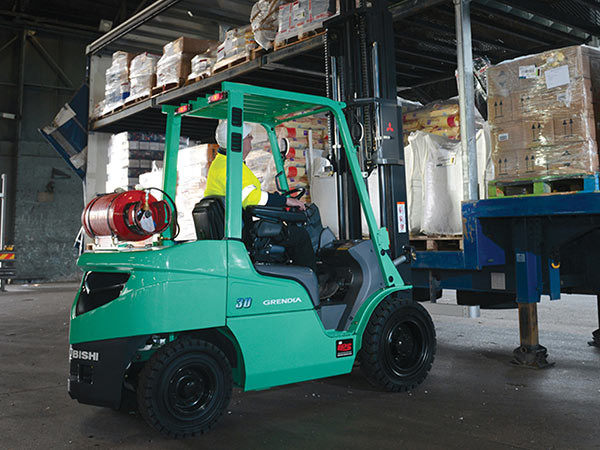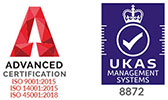When it comes to purchasing equipment for your warehouse, it’s important that you’re acquiring equipment that you actually need. It can be easy to buy a machine that will do the same job as a forklift with the right attachment, for example. Although we can draw many comparisons between a forklift and other pieces of material handling equipment, today, we’re going to be comparing the ever-popular forklift with the not-so-common warehouse stacker.
This way, you’ll be able to decide whether or not you need both pieces of equipment, or whether your warehouse would run smoothly by simply using a forklift with the right attachments. On the other hand, you may well discover that they’re quite different, so let us tell you what the differences are between a forklift and a stacker, together with the benefits of them both.
What is a forklift?
Forklifts are some of the most common pieces of material handling equipment on the market. This is because there are many makes and models available, with each one offering different capabilities. In addition to that, they also vary greatly in size to accommodate for even the smallest of premises. They can be powered by either diesel, LPG or electricity, so there are plenty of options for every warehouse owner, whether you want to reduce your carbon footprint, keep noise levels low or simply want a powerful machine for outdoor use. Forklifts can also be used to load, transport and unload inventory and stock of a considerable weight, but many models also have impressive reaching capabilities – ideal for warehouse owners who have even the tallest of racking and industrial shelving. Commonly confused for a reach truck, which seamlessly complements the work of a forklift, forklifts actually have many different functions, mainly because they are able to accommodate different attachments as and when needed. Whether you need it to clear snow from your paths and pavements or require extra length on the forks, forklift attachments can transform your already versatile machine into something that meets your needs more specifically, without having to buy another piece of material handling equipment. Although we have already touched, briefly, on many of the benefits that forklifts have to offer, let’s delve a little deeper into exactly how advantageous they are for any warehouse owner, regardless of the industry you work in or the nature of the stock you handle.What are the benefits of a forklift?
There are many different benefits that a forklift has to offer a forklift owner. It’s no wonder they continue to be a hit with warehouse owners, from those who work in retail and catering right through to construction and agriculture. Without further ado, let’s take a look at why forklifts remain top dog when it comes to acquiring material handling equipment that will get the job done:- They’re safe & comfortable to use – forklifts are designed with safety and comfort at the forefront these days, meaning that your operators and those on the ground will be safe from harm when in use. Also, operators will be able to spend longer behind the wheel thanks to their ergonomic design and easy-to-use dashboard and controls
- They make operations more efficient – forklifts come in a range of models, each one offering different capabilities. Whether you need one to carry out simple jobs are require a powerful machine to carry out the heaviest of tasks, there will be a forklift on the market that will seamlessly meet your needs, making your operations run more smoothly and efficiently
- They can handle even the heaviest of loads – this is what makes forklifts perfect for many different industries. Whether you’re handling heavy construction or manufacturing materials or need to transport lighter loads, a forklift will make short work of manoeuvring loads of considerable weights with complete ease, saving you time and preventing injury from manual lifting and carrying
- They’re very versatile – forklifts are versatile, not only because there are plenty of models and functions for you to choose from, but because there are forklift attachments on offer that almost allows you to customise your forklift and its capabilities. This makes for a bespoke machine that you will always be able to count on
- They’re eco-friendly – depending on the fuel option you choose, forklifts are often considered to be environmentally-friendly. Electric forklifts are the most eco-friendly, with LPG forklifts following close behind. This also allows forklifts to be used indoors, as well as outside, which we’ll get onto in a moment
- They can be used both inside and outdoors – electric forklifts are mainly used inside, with LPG forklifts being used both indoors and outside. Diesel forklifts, on the other hand, are often operated outdoors thanks to their cheer level of power and robustness. They can travel across loose, uneven or rough terrain with complete ease, whilst also ensuring the safety of the operator and everyone on the ground
- There’s an option available for even the smallest of warehouses – VNA forklifts are the perfect option for warehouses that are either very small or have narrow aisles and tight spaces. Multi-directional forklifts are also a common choice where space is at a premium, but there will always be a solution for any warehouse, of any size
What is a stacker?
A stacker is often confused for a forklift, mainly because of its appearance. It looks and behaves much like a forklift, but it’s far smaller and more compact in size, but doesn’t provide the same level of robustness and power as a VNA forklift or a multi-directional forklift. Stackers are best for industries where loads aren’t considerably weighty or large, instead catering for stock that is lighter and smaller. Construction, engineering, manufacturing and agriculture industries, for example, wouldn’t benefit much from a stacker, for example. Unlike forklifts, they’re suitable for indoor use only as they’re quiet when in operations and they’re typically powered by electricity. Stackers are available in manual operation or as pump trucks, so not all stacker models are powered. In fact, stackers are either manual, semi-electric or fully-electric. As the name would suggest, stackers are used to stack pallets onto warehouse racking. Electric or semi-electric stackers are used in place of manual pallet stackers that lack the reaching or lifting capabilities. This is why you might find that some warehouse owners have a few variations of the same machine. You should ask yourself whether that’s wholly necessary for you when looking at your budget and the equipment you have in place already.What are the benefits of a stacker?
There are several benefits of a pallet stacker that we’ve briefly mentioned there, but just in case you missed a few, let’s take the time to summarise all of the benefits that a pallet stacker has to offer even the most seasoned warehouse owner:- They’re compact in size – they’re ideal for small warehouses where space is too tight even for a VNA forklift. This is because they’re slimmer and shorter than their more powerful counterparts
- They’re cost-effective – warehouse stacker aren’t as expensive as a forklift, so if you feel as though your operations would still be able to run smoothly without a forklift, using just a stacker instead, then this would be a worthwhile option
- They’re environmentally-friendly – available in only manual, semi-electric or electric models, stackers are often considered to be more eco-friendly than even a forklift, unless that too is powered by electricity
- A licence isn’t required to operate one – unlike a forklift, the operator won’t need a licence to operate a stacker. However, adequate training will still be needed to ensure the safety of both the operator and those on the ground
Stackers vs. forklifts: what’s the difference?
Let’s take the opportunity to summarise everything we’ve discussed in this article regarding the key differences between a forklift and a warehouse stacker. This might help you to realise that you need both machines, or that you’d actually still be able to run your operations productively and efficiently with one or the other. Here are the key differences between a forklift and a warehouse stacker:- Both forklifts and stackers are eco-friendly, when choosing electric or LPG-powered models (applicable with the forklift only)
- Stackers are more streamlined and compact than a VNA forklift, making them a popular choice with very small warehouses
- Forklifts are able to accommodate attachments to allow for bespoke customisation, whereas a stacker cannot accommodate attachments
- Stackers can carry loads that are lighter and smaller, whereas forklifts are best for carrying considerably heavy and/or large loads
- Like forklifts, the reach height on a stacker will vary depending on the model you choose and the budget you have
- Forklifts can be used both inside and outdoors, whereas a stacker is only really suitable for indoor use
- You will need a licence to operate a forklift, whereas you won’t need one to operate a stacker, but training is still needed to be able to drive both safely
- Both pieces of equipment are designed to make warehouse operations more efficient and productive







